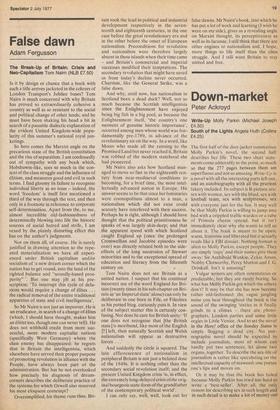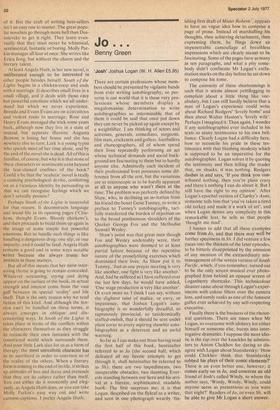Down-market
Peter Ackroyd
The first half of the dust-jacket summarises Molly I'arkin's novel, the second half describes her life. These two short state- ments come admirably to the point, so much - so that the 277 pages between them are superfluous and not so amusing. Write-Up is a novel with all the interesting parts left out, and an .autobiography with all the prurient fakery included. Its subject is B-picture sex: sex with women, sex with the blind, sex with football team, sex with sculptresses, sex with everyone just for the fun. It may well be that Molly Parkin is willing to jump into bed with a crippled traffic warden or a tube of Primula cheese spread, but it isn't immediately clear why she wants to tell us about it. The book is meant to be open, warm, feminine and liberated but it actually reads like 'a FBI dossier. Nothing human is alien to Molly Parkin, except people. They are simply 'copy' and their names give them away: Sir Archibald Wankie, Zekie Arsan, Nobby Clotworthy, Percy Mutton and J. G. Drinkall. Isn't it amusing?
Vulgar writers are often ostentatious or predictable, but they are rarely boring. So what has Molly Parkin got which the others don:t? It may he that she has now become rather old-fashioned: the vague jangling noise you hear throughout the book is the sound of the swinging 'sixties as it finally grinds to a climax - there are photo- graphers, London parties and some little orgies in Little Venice. And to set the novel in the Here! office of the Sunday Status is simply flogging a dead city. No por- nographic novel should he expected to include journalists, most of whom can hardly put two sentences, let alone two organs, together. To describe the sex-life of journalists is rather like speculating on the intellectual capacity of seaweed: one purses brie's lips and moves on.
Or it may he that the book has failed because Molly Parkin has tried too hard to write a 'best-seller'. After all, the only reason for describing sex at such length and in such detail is to make a lot of money out of it. But the craft of writing best-sellers isn't an easy one to master. The great popu- lar novelists go through more hell than Dos- toievsky to get it right. They learn .even- tually that they must never he whimsical, sentimental, fantastic oil boring. Molly Par. kin manages all four at once. She writes like Erica Jong, but without the charm and the literary talent.
At least Angela Huth, in her new novel, is unliberated enough to be interested in other people besides herself. South of the Lights begins in a chicken-coop and ends with a marriage. It describes small lives in a small village, and it deals with those easy but powerful emotions which we all under- stand but which we never experience. Brendaand Evans Evans are on a circuitous and violent route to marriage; Rose and Henry Evans managed the trick some years baCk, although now they live in a state of mutual but separate illusion; Augusta Browne is losing her house and she has nowhere else to turn; Lark is a young typist who spends most of her time alone, and by the end of the novel she is.dead. All of this is familiar, of course, butwhyis it that none of these characters or sentiments exist beyond the tear-stained confines of the book? Could it he that the 'realistic' novel is really a cunning psychological device, conferring on us a vicarious identity by persuading us that we can recognise feelings which we don't actually possess?
Perhaps South of the Lights is successful for that reason. It deconstructs language and social life in its opening pages (`Chic- kens, thought Evans. Bloody chickens'), and then proceeds to build them up again in the image of some simple but powerful emotions. But to handle such things is like handling a dangerous drug: one slip, or• one impurity, and it could be fatal. Angela Huth remains a good and in some ways notable writer because she always trusts her instincts in these matters.
But all of this means that her most inter- esting theme is going to remain concealed. Whatever screaming, crying and dying appear on the surface of the hook, its actual strength and interest come from the vast gulf between its special 'reality' and life itself. That is the only reason why we read fiction of this kind. And although the ten- sion can't be handled on these terms, it always emerges in oblique and -dis- concerting ways. In South of the Lights it takes place in terms of the conflicts within the characters themselves as they struggle to reconcile their own fantasies with the constricted world which surrounds them. And poor little Lark dies for us as a form of therapy: the most unrealistic character has to he sacrificed in order to convince us of the reality of the others. When a literary_ form is coming to the end of its life, it strikes up attitudes of loss and decay and pretends that they are its subject rather than itself. You can either do it innocently and eleg- antly, as Angela Huth does, or you can take Molly Parkin's easy way out and write cartoon-captions. I prefer Angela H uth.



































 Previous page
Previous page